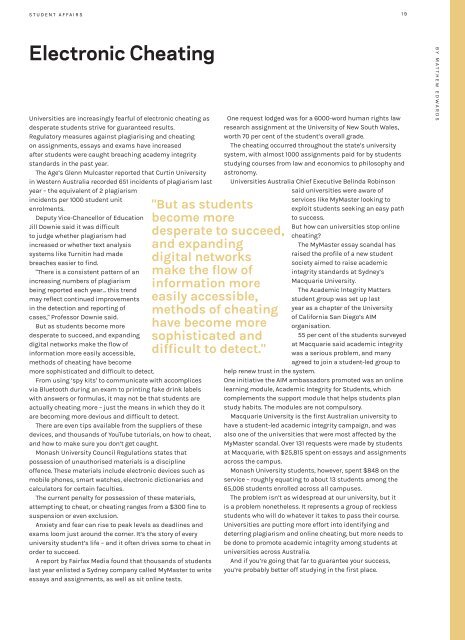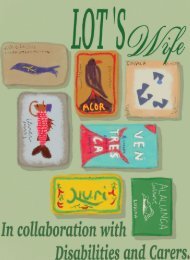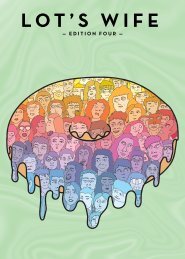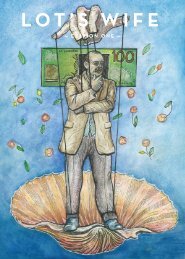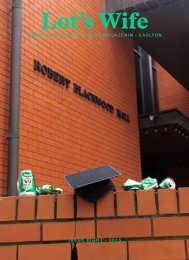Lot's Wife Edition 6 2015
You also want an ePaper? Increase the reach of your titles
YUMPU automatically turns print PDFs into web optimized ePapers that Google loves.
STUDENT AFFAIRS 19<br />
Electronic Cheating<br />
Universities are increasingly fearful of electronic cheating as<br />
desperate students strive for guaranteed results.<br />
Regulatory measures against plagiarising and cheating<br />
on assignments, essays and exams have increased<br />
after students were caught breaching academy integrity<br />
standards in the past year.<br />
The Age’s Glenn Mulcaster reported that Curtin University<br />
in Western Australia recorded 651 incidents of plagiarism last<br />
year – the equivalent of 2 plagiarism<br />
incidents per 1000 student unit<br />
enrolments.<br />
Deputy Vice-Chancellor of Education<br />
Jill Downie said it was difficult<br />
to judge whether plagiarism had<br />
increased or whether text analysis<br />
systems like Turnitin had made<br />
breaches easier to find.<br />
"There is a consistent pattern of an<br />
increasing numbers of plagiarism<br />
being reported each year... this trend<br />
may reflect continued improvements<br />
in the detection and reporting of<br />
cases," Professor Downie said.<br />
But as students become more<br />
desperate to succeed, and expanding<br />
digital networks make the flow of<br />
information more easily accessible,<br />
methods of cheating have become<br />
more sophisticated and difficult to detect.<br />
From using ‘spy kits’ to communicate with accomplices<br />
via Bluetooth during an exam to printing fake drink labels<br />
with answers or formulas, it may not be that students are<br />
actually cheating more – just the means in which they do it<br />
are becoming more devious and difficult to detect.<br />
There are even tips available from the suppliers of these<br />
devices, and thousands of YouTube tutorials, on how to cheat,<br />
and how to make sure you don’t get caught.<br />
Monash University Council Regulations states that<br />
possession of unauthorised materials is a discipline<br />
offence. These materials include electronic devices such as<br />
mobile phones, smart watches, electronic dictionaries and<br />
calculators for certain faculties.<br />
The current penalty for possession of these materials,<br />
attempting to cheat, or cheating ranges from a $300 fine to<br />
suspension or even exclusion.<br />
Anxiety and fear can rise to peak levels as deadlines and<br />
exams loom just around the corner. It’s the story of every<br />
university student’s life – and it often drives some to cheat in<br />
order to succeed.<br />
A report by Fairfax Media found that thousands of students<br />
last year enlisted a Sydney company called MyMaster to write<br />
essays and assignments, as well as sit online tests.<br />
"But as students<br />
become more<br />
desperate to succeed,<br />
and expanding<br />
digital networks<br />
make the flow of<br />
information more<br />
easily accessible,<br />
methods of cheating<br />
have become more<br />
sophisticated and<br />
difficult to detect."<br />
One request lodged was for a 6000-word human rights law<br />
research assignment at the University of New South Wales,<br />
worth 70 per cent of the student’s overall grade.<br />
The cheating occurred throughout the state’s university<br />
system, with almost 1000 assignments paid for by students<br />
studying courses from law and economics to philosophy and<br />
astronomy.<br />
Universities Australia Chief Executive Belinda Robinson<br />
said universities were aware of<br />
services like MyMaster looking to<br />
exploit students seeking an easy path<br />
to success.<br />
But how can universities stop online<br />
cheating?<br />
The MyMaster essay scandal has<br />
raised the profile of a new student<br />
society aimed to raise academic<br />
integrity standards at Sydney’s<br />
Macquarie University.<br />
The Academic Integrity Matters<br />
student group was set up last<br />
year as a chapter of the University<br />
of California San Diego’s AIM<br />
organisation.<br />
55 per cent of the students surveyed<br />
at Macquarie said academic integrity<br />
was a serious problem, and many<br />
agreed to join a student-led group to<br />
help renew trust in the system.<br />
One initiative the AIM ambassadors promoted was an online<br />
learning module, Academic Integrity for Students, which<br />
complements the support module that helps students plan<br />
study habits. The modules are not compulsory.<br />
Macquarie University is the first Australian university to<br />
have a student-led academic integrity campaign, and was<br />
also one of the universities that were most affected by the<br />
MyMaster scandal. Over 131 requests were made by students<br />
at Macquarie, with $25,815 spent on essays and assignments<br />
across the campus.<br />
Monash University students, however, spent $848 on the<br />
service – roughly equating to about 13 students among the<br />
65,006 students enrolled across all campuses.<br />
The problem isn’t as widespread at our university, but it<br />
is a problem nonetheless. It represents a group of reckless<br />
students who will do whatever it takes to pass their course.<br />
Universities are putting more effort into identifying and<br />
deterring plagiarism and online cheating, but more needs to<br />
be done to promote academic integrity among students at<br />
universities across Australia.<br />
And if you’re going that far to guarantee your success,<br />
you’re probably better off studying in the first place.<br />
BY MATTHEW EDWARDS


